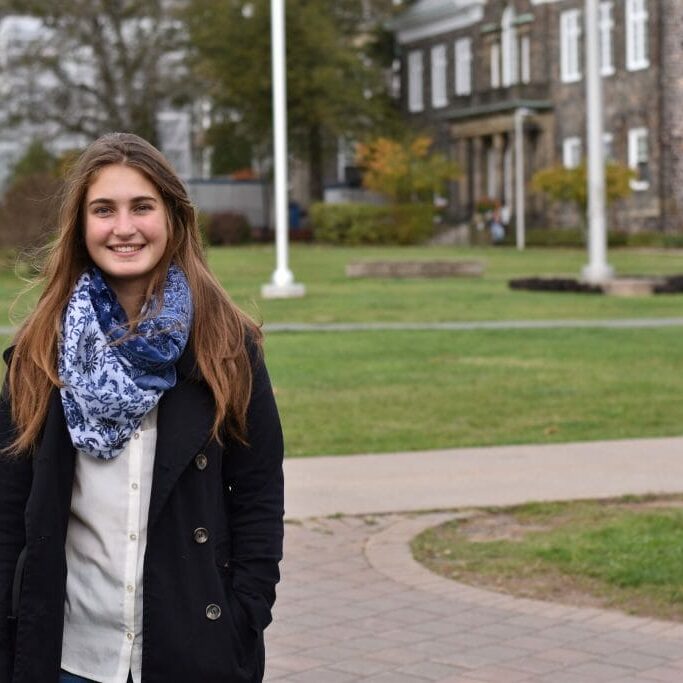
Dal students work to further UN’s Sustainable Development Goals
Three Dal students create air quality measurement devices and climate action tools
For Paul Bissonnette, the adventure started in summer 2016. Two weeks before he was scheduled to be in New York for the World Merit 360 conference, the fourth-year chemistry student loaded a hundred pounds of gear onto his bicycle, including solar panels and air-quality measurement instruments.
He jumped on a ferry to Portland, Maine, and after he finished at the boarder, he started pedaling.
Over the 12 days it took Bissonnette to make it to New York, he was measuring air quality all the way. Not because he had much hope of discovering anything new about pollution on that stretch of coastline, but rather, to prove something.
“Many parts of the world that have the worst air pollution also have the least measurement of air quality,” says Bissonnette. He wanted to show people it’s possible to measure air pollution in a way that is low-cost and off-grid.
After some bad luck near the end of the trip, involving a flooded field and ruined food stores, Bissonnette made it to New York on an empty stomach, but full of momentum.
He joined 359 other young people from across the world, to work on the United Nations’ Sustainable Development Goals (SDGs). Totaling 17 goals and 169 sub-targets, the SDGs range from eliminating poverty and hunger, to economic growth and urgent action on climate change.
Bissonnette was working on SDG 11, Sustainable Cities and Communities, because one of its targets involves air quality.

Paul Bissonnette biked from Maine to New York to measure air quality. (Photo by Mira Chiasson)
“A lot of our production is outsourced to more impoverished areas so they end up getting subjected to our pollution,” says Bissonette. “We just outsource it to them. I think it’s really important to work towards reducing that. That’s why it’s one of the targets – it kills a lot of people.”
At the World Merit 360 Conference, Bissonnette pitched a project he’s been working on along with other Dalhousie students. It involves developing a system to measure air quality by using satellites, a project he wants to delve further into when he starts grad school next year.
Bissonnette sees his work as a small but important part of working towards the high-reaching SDGs.
“They’re definitely idealistic. They’re huge goals. The pessimistic side of me thinks that whether or not they’re attainable is a question of how well we can work together between nations.”
“I’m somewhat hesitant to say they will be achieved, based on what’s happening in the States now. A lot of that is going to impede global cooperation,” he adds.
Jasveen Brar and Caitlin Grady also attended the World Merit 360 conference during the summer, but they were working on a different goal: SDG 13, Climate Action. Together with a group of about 20 other young people from across the world, they came up with a project to address this goal.
“We’ve been working for the past six to seven months on a project called the Climate Express, which aims to support communities in adapting to the effects of climate change,” says Grady.
By partnering with local NGOs and experts as well as tapping into international expertise, they aim to provide vulnerable communities with recommendations and support on dealing with climate change.

Jasveen Brar (pictured) and Caitlin Grady will run a pilot project of their climate adaption project, Climate Express, in Ghana this summer. (Photo by Patrick Fulgencio)
“The team we’ll be assembling will be in large part local people. We want to recognize that climate change is a global issue and that there are professors and experts all around the world who have knowledge about it that would be useful to the community,” she adds.
For her teammate, Jasveen Brar, the severity of human impacts on natural systems became a reality when she visited Antarctica two years ago and the Arctic this past summer. She remembers seeing a plastic bottle on the shoreline, and thinking to herself: “Seriously? Even here?”
“As a global society, not only are we impacting our own communities, but we’re impacting those isolated areas where nobody lives,” says Brar. “We’re disrupting ecosystems and the change is massive.”
To Brar, sharing those stories are important. “It impacted me so much so maybe it’ll change another heart too.”
And with the Climate Express, it became a real opportunity create some change.
“We wanted to focus on something that was more action-based. Which is when we came up with the Climate Express. It became this really tangible idea, because in our group itself we had partners, we had people who had these experiences and this knowledge that we may not have come across otherwise,” says Brar.
If all goes well, after the launch of the website and some fundraising, the group will be running a pilot version of the project in Ghana this summer.
Grady and Brar are excited and hopeful about the project, even though they know that achieving the SDG goals may never be possible. But they’re trying.
“I think our world is going to be pretty screwed in a lot of ways if we don’t reach a lot of those targets,” says Grady. “And hey, maybe we’ll never reach them, but if at least we have a go at it and do our best, I think the world will be better off.”






